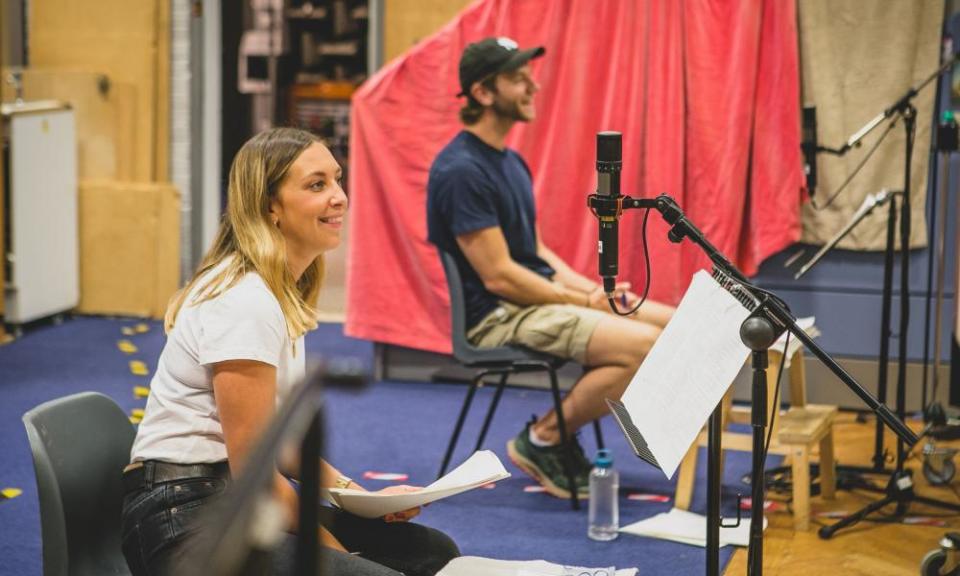The week in radio and podcasts: Marcovaldo; Peter Brook; Shedunnit; The Archers – review
Marcovaldo Radio 4 | BBC Sounds
Peter Brook Radio 4 | BBC Sounds
Shedunnit | shedunnitshow.com
The Archers Radio 4 | BBC Sounds
BBC Radio got it wrong about Prince Philip. First there was the overwhelming coverage: switching between Radios 3 and 4, it seemed that nothing else – Covid? Syria? – had happened. Then, there was the mangling of schedules. Two days after his death, I tuned in to Radio 3 to hear the always independent-minded Paul Morley talking about anti-establishment art. Instead, I got Daniel Barenboim playing Mozart. Nothing against the latter: on the contrary. But the unexplained assumptions behind the change are intriguing. Was Morley thought too provoking because the duke was not famous as a fan of the avant garde? Was an evening of classical music considered inherently respectful? Posher? More soothing?
Radio reassurance is a complicated matter. Italo Calvino’s Marcovaldo stories, dramatised in five instalments by the actor Toby Jones from William Weaver’s translation, at first sounded cosy. Jones has a wonderfully unfruity voice, crumpled but emphatic, and he narrated the tales as if he were summoning up his own memories. As the episodes flicked into dramatic life, with excellent Mackenzie Crook as the hero, and street music uncurling in the background, their perturbing depths were made apparent by Nadia Molinari’s elegant production.
Caroline Crampton's crisp voice is mercifully free of that ‘listen-to-my-smile’ tone so beloved of presenters
Calvino writes of cramped circumstances and celestial dreams. His hero, who lives in an attic with his wife and six children, sees signs of a greater vitality around, beneath and above him. Mushrooms push up through the city pavements – and poison those who eat them. The constellations are glimpsed from a small window, but are obscured by a flashing neon sign. Soap bubbles float like garlands into the air, only to be blackened by the soot from the factory in which Marcovaldo works. Yet even when crushed, these visions are beautifully realised. Each provided a radiant 15 minutes: enough to quicken the pulse of the radio day.
There was further quickening when Glenda Jackson talked to Peter Brook about his theatre work – sometimes furiously political, sometimes dissolving audience expectations by showing “magic in full view”. He was in Paris, she in London: he told her she sounded as if she was using a megaphone to coach a team. You’re exaggerating, said Jackson, amused. “Of course I am, I’ve been doing that all my life.” Brook refuses to be called a director – a “dreadful title” unless you’re a businessman – but will settle for being a “guide” who can point out the snakes in unknown terrain.
Jackson auditioned for him in 1964, reading a speech by Dorothy Parker. She subsequently heard he had to be persuaded to employ her. Brook doesn’t demur: just says she should not look back. Both take it for granted that the theatre can be one of the most intense ways of exploring feeling and thought.
Pauline Harris’s production of their conversation, recorded last month, was a lesson in how the BBC can genuinely vary its voices. By letting people speak fully as individuals. Brook has just turned 96; Jackson is 84. They were not introduced as marvellous specimens or representatives of an age group. Their years were not the point: they were there because they’d had time to do interesting things.
Anti-cosiness is part of Caroline Crampton’s mission in Shedunnit. Her podcasts on detective fiction of the 1920s and 30s show that this “golden age” is more peculiar and more socially incisive than commonly thought. A subject that began by seeming tiny has proved, over two-and-a-half years of podding, infinitely expandable. Crampton has looked at “spinsterhood” as a superpower, since it renders women invisible, and investigated clues to queerness in novels: one is men who have long fingers.
She has traced unsolved real-life murders, such as that of the young nurse who in 1926 disappeared from a ladies’ cloakroom and was found alongside a hypodermic syringe; reporters thought her racy because she had newfangled bobbed hair. Considering the craze for puzzles that coincided with the rise of detective fiction, Crampton dubs crosswords “murder mysteries in grid form”. Each airy episode is helped by her crisp voice, mercifully free of that “listen-to-my-smile” tone so beloved of presenters.

Entrenched in a reputation for snugness – and smugness – The Archers can supply disturbing storylines. It is the gradual human unravellings that shake a regular listener. Who would have thought that Alice Carter (played with edgy musicality by Hollie Chapman) was becoming an alcoholic? She rarely slurs but is – convincingly – nasty when under the influence. The corrosive effects of her illness are touching for those who, having listened to her growing up as the brainy pet of her family, thought she was for ever protected. The signs were there, planted over years, but you would have to be a golden age detective to have spotted them.

 Yahoo Finance
Yahoo Finance 